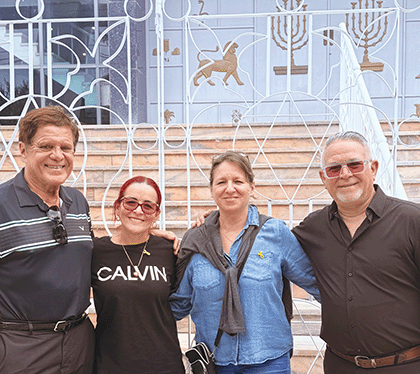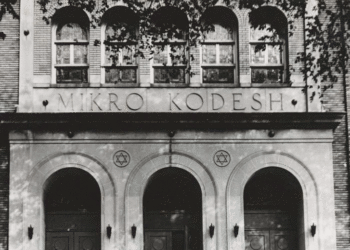By MICHAEL APPLEMAN
During my December humanitarian mission to Havana, Cuba, after visa and immigration impediments at José Martí International Airport, I was shocked and stunned to discover that Cuba is teetering on the brink of economic collapse. The Jewish Cubans, however, are surviving — barely.
The Cuban economy is disintegrating, exacerbated by the crippling fuel crisis, the failing islandwide electrical grids and the scarcity of food.

The island of 11 million residents has gas lines six blocks long, with drivers sleeping in their cars for five days until it is their turn, only to get a half-tank of gas. The electrical islandwide blackouts are crippling. Cuba closed its schools, government buildings and nonessential businesses.
The queues for chicken, bread, vegetables and water go deep. Yet, the island’s small but resilient Jewish community is thwarting this existential threat.
With a rich history dating back to the 1900s, Cuba’s Jewish population has endured numerous challenges, from the Holocaust to the Cuban Revolution. Hitler killed the Jews. Castro attempted to kill the practice of Judaism. The Cubans are now at risk, not because of antisemitism (which is virtually nonexistent), but because of the country’s infrastructure disintegration.
Castro prohibited the practice of Judaism from 1959 until 1990. Then, the constitution was amended to allow the practice of Judaism and Christianity, after a visit from the pope.
The American Jewish Joint Distribution Committee (JDC) infused the community with capital and Spanish-speaking rabbis and cantors from South America. The JDC restored the dilapidated synagogues and taught Cubans about their heritage, language and practices. Three decades of Judaic practices were lost but revived due to the generosity of JDC.
Today, approximately 1,500 Jews remain on the island — 15,000 before the 1959 Cuban Revolution — with the majority residing in Havana. Many missions, including one from my shul, Beth El Synagogue, have helped revitalize the community through donations of humanitarian items to a populace whose average income is less than $250 a year.
As the fuel, electrical and food crises now deepen, Jewish Cubans are relying on their tight-knit community and resourcefulness to cope with the shortages and economic instability.
The Jewish community has established a network of support, with families and individuals sharing food, medicine and other essential resources. The community has also organized collective meals, known as comidas colectivas, where members gather to share food and company.
In 15 years of humanitarian missions, I have established and nurtured close relationships with the leaders of the Jewish community at Beth Shalom Synagogue (El Patronato) in Havana. The week prior to my visit I was saddened to learn that Adele Dworin, who was president of the community and known by hundreds of American visitors, had died.
I knew and adored Adele. Her English presentations of Jewish Cuban history to visitors were always charming, informative and moving. David Prinstein has taken over her role. He is now the president, and Hella Ezkenazi is the vice president.
This trip, I personally shlepped (you cannot mail nor ship items to Cuba because of the embargo) over 30 Jewish calendars for the Hebrew teachers so they could track the Jewish holidays — they rarely have internet access. We thank you, Rabbi Yossi Bendet, of Chabad Bloomington, for your calendar donation. We also donated Hanuka gelt, fine schnapps (Scotch whisky) and chocolate americano (from Costco). My suitcases were over the legal weight limit.
Personal effects that are taken for granted by Americans are items of immense value that are appreciated with exuberance and effervescence by the Cubans. For the situation is dire: No gas. No electricity. No food. With the paucity of gas, resultant diminished tourism and little to no money due to exorbitant inflation, the Cubans are beginning to lose all hope.
The following is my interview with Hella Eskeanazi, vice president of the Jewish community.
Michael Appleman: Hella, how long have you been vice president of the Comunidad Hebrea de Cuba (Jewish Community of Cuba)?
Hella Eskenazi: Vice president for one year; 18 years director of the Hebrew school.
MA: How has the Cuban economic crisis of no electricity, gasoline and food affected the Jewish community?
HE: It is nearly impossible to buy chicken, rice, beans or any food for Shabbat dinner at the synagogue. You cannot buy gasoline or diesel. The lines for gas are seven blocks long. Without transportation, we are witnessing an economic collapse of the entire country of Cuba.
MA: How do you meet this crisis?
HE: We don’t! We have to stay home. We used to have religious services and Hebrew school every Shabbat. Now, we only have services and school once a month.
MA: What else has changed in this economic crisis?
HE: After the pandemic, the amount of money that we received from the Joint Distribution Committee diminished. [The JDC cannot send money directly from the United States due to the embargo. Money is sent through a Paris bank to a Havana bank.] The Havana bank gives us an exchange rate of 24 pesos per dollar. The real market exchange rate is 325 pesos per dollar. Because the world knows we do not have gasoline, food and electricity, tourism is negligible. Jewish groups rarely come. The only way we can survive is through the JDC and cash donations from groups.
MA: Who is the new president of Comunidad Hebrea de Cuba?
HE: David Prinstein has been president for one year. Adela Dworin, the former president for nearly two decades, died last week. There will be a memorial service for her in January.
MA: How many Hebrew teachers are there?
HE: There are 14 voluntary teachers. Thank you for the Hanuka gelt, dreidels and the chocolate Americano.
MA: Besides celebrating Shabbat and other holidays and teaching students in your Hebrew school, what other activities are provided?
HE: We are very active in BBYO (B’nai B’rith Youth Organization) and will be participating in the Maccabi games.
Despite the economic challenges, Jewish Cubans remain resiliently committed to their community and to Judaic practices. I attended Friday night Kabbalat Shabbat services at Beth Shalom. Four Cuban young adults conducted the service, chanting Shema, Lecha Dodi, and Adon Olam, no differently than we hear in universal synagogues. A Shabbat dinner followed, but, unfortunately it would be the only Shabbat dinner for that month.
As the island’s economic situation continues to deteriorate, Cuban Jews are drawing on their resilience and resourcefulness to navigate the uncertainty.
“We’ve been through difficult times before,” said one member. “We’ll get through this, too, together as a community.”
My return trip to the Havana airport after spending a wonderful time with Communidad Hebrea de Cuba, was precarious. It was another Cuban nail-biter — I had been detained previously. There was little gasoline in our tank, and the gas stations were closed.
Baruch haShem, my driver, David, was a savvy local. He knew someone who knew someone who sells gasoline in the black market. We went to this house in Vadado, an area near Havana, watching behind our backs. We walked through the gate. To the left, there were large plastic canisters of gasoline, for which we paid $12 a gallon. David put the drums on top of the car and siphoned the canisters through a long rubber tube into the tank.
Time was of the essence. My flight to Miami was departing soon. To miss my flight and to be stranded in a totalitarian, dictatorial regime, with nonfunctioning American credit cards, is very precarious. The Cubans could trump up charges and detain me.
When David ultimately dropped me off at Terminal 3 at José Martí airport; when I cleared immigration in Havana; when I cleared immigration and customs in Miami, I felt, for the first time (albeit in a small way), the relief that my Russian and Romanian grandparents felt when they landed at Ellis Island, the entry port for immigrants.
I arrived in Minneapolis with 20 pieces of original art for CubanoGallery in Golden Valley. This unique collection of stunning abstracts, Cuban cars and portraits is a must-see. The Cuban art will be sold to support the Cuban people, who live in a country that is teetering on collapse.
Cuban elections are not multi-party elections. There is only one party, the communist dictatorial regime.
I shall continue to call out the dire situation of the Cuban people. I shall continue to support the Jewish community that has not lost hope.
***
Michael Appleman, Ph.D., is a graduate of Torah Academy and Talmud Torah. He can be contacted at: appleman.michael@gmail.com. Referenced new art may be found at: cubanogallery.com.
(American Jewish World, February 2025)



















